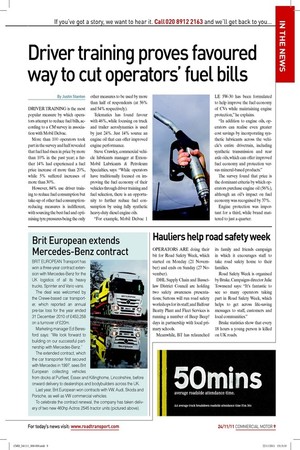Driver training proves favoured way to cut operators’ fuel bills
Page 8

If you've noticed an error in this article please click here to report it so we can fix it.
By Justin Stanton
DRIVER TRAINING is the most popular measure by which operators attempt to reduce fuel bills, according to a CM survey in association with Mobil Delvac.
More than 100 operators took part in the survey and half revealed that fuel had risen in price by more than 10% in the past year; a further 14% had experienced a fuel price increase of more than 20%, while 5% suffered increases of more than 30%.
However, 84% use driver training to reduce fuel consumption but take-up of other fuel consumptionreducing measures is indifferent, with sourcing the best fuel and optimising tyre pressures being the only other measures to be used by more than half of respondents (at 56% and 54% respectively).
Telematics has found favour with 46%, while focusing on truck and trailer aerodynamics is used by just 24%. Just 14% source an engine oil that can offer improved engine performance.
Steve Crawley, commercial vehicle lubricants manager at ExxonMobil Lubricants & Petroleum Specialties, says: “While operators have traditionally focused on improving the fuel economy of their vehicles through driver training and fuel selection, there is an opportunity to further reduce fuel consumption by using fully synthetic heavy-duty diesel engine oils.
“For example, Mobil Delvac 1 LE 5W-30 has been formulated to help improve the fuel economy of CVs while maintaining engine protection,” he explains.
“In addition to engine oils, operators can realise even greater cost savings by incorporating synthetic lubricants across the vehicle’s entire drivetrain, including synthetic transmission and rear axle oils, which can offer improved fuel economy and protection versus mineral-based products.” The survey found that price is the dominant criteria by which operators purchase engine oil (56%), although an oil’s impact on fuel economy was recognised by 37%.
Engine protection was important for a third, while brand mattered to just a quarter.













































